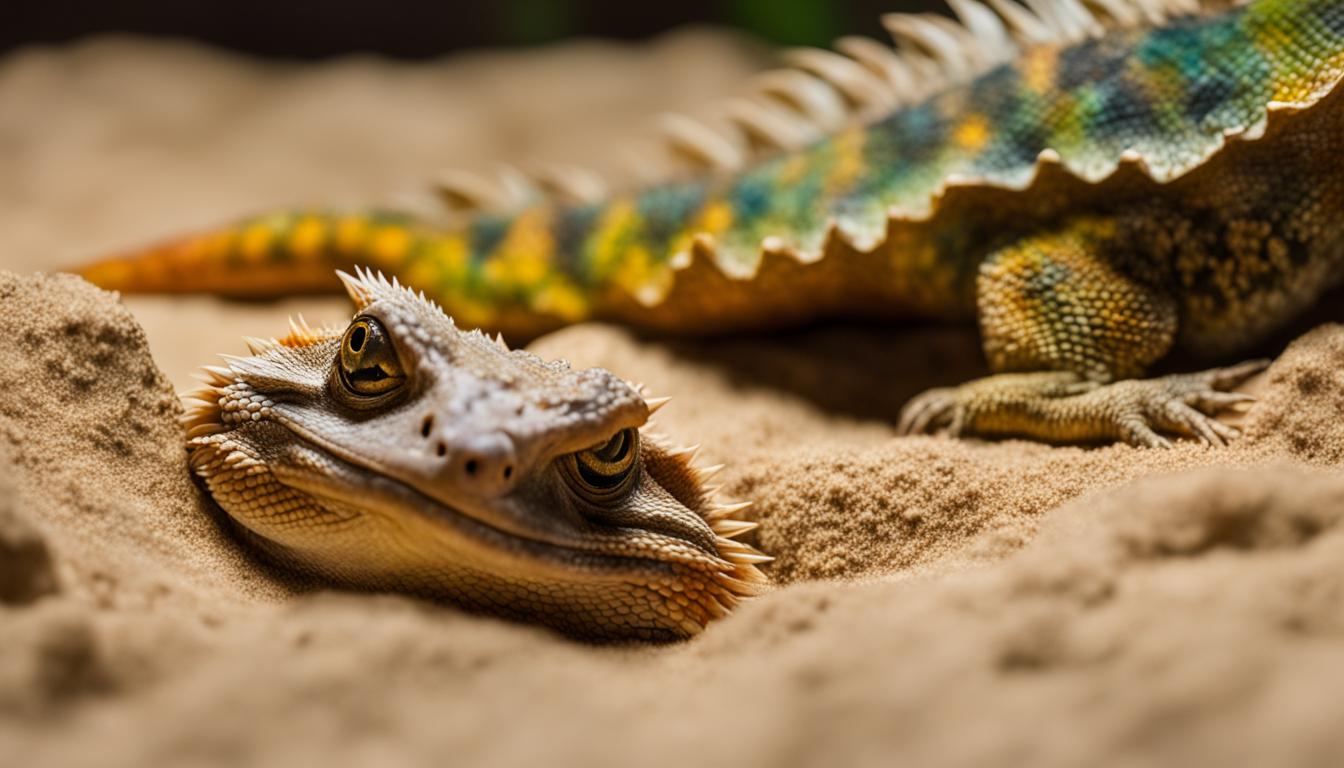Welcome to our comprehensive guide on impacted bearded dragon care and treatment. Dealing with impaction in bearded dragons can be a serious and concerning issue, but with proper knowledge and proactive measures, you can help your reptilian friend recover and thrive again. Impaction occurs when a blockage forms in the digestive tract, leading to potential life-threatening complications.
Impaction can be caused by various factors such as consuming food items that are too large, improper habitat temperatures, and ingestion of dangerous substrates. Early detection and timely intervention are crucial for successful treatment. Understanding the signs, preventive measures, and treatment options can greatly contribute to the well-being of your bearded dragon.
Key Takeaways:
- Impaction in bearded dragons is a serious condition that can lead to severe complications.
- Common causes of impaction include eating large food items and improper habitat temperatures.
- Early signs of impaction include irregular bowel movements, leg trembles, and regurgitation.
- Treatment options for impaction include warm baths, gentle massages, and veterinary care.
- Prevention of impaction can be achieved through proper feeding habits and habitat maintenance.
Causes of Impaction in Bearded Dragons
When it comes to understanding the causes of impaction in bearded dragons, it’s important to consider various factors that can contribute to this condition. By identifying these causes, you can take proactive steps to prevent impaction and ensure the well-being of your bearded dragon.
One common cause of impaction is the ingestion of food items that are too large for the bearded dragon’s digestive tract to handle. This includes large crickets, mealworms, and superworms, which can become lodged in the digestive system, leading to blockages and discomfort for the reptile.
Another factor that can impact the digestive system of bearded dragons is improper habitat temperatures. These reptiles require specific temperatures to aid in the digestion process. Inadequate temperatures can slow down digestion, making them more prone to impaction.
Additionally, the choice of substrate used in the bearded dragon’s habitat can also play a role in impaction. Some substrates, such as Calci-Sand and pellets, can be dangerous if ingested. These materials can clump together in the digestive system, causing obstructions and impaction.
To prevent impaction, it is crucial to research and choose safe substrates for your bearded dragon’s habitat. Additionally, ensure that you provide appropriate temperatures in the habitat and avoid feeding your dragon food items that are too large for their digestive system to handle.
“Ingesting food items that are too large, improper temperatures, and dangerous substrates are common causes of impaction in bearded dragons.”
By understanding and addressing these causes, you can help maintain the digestive health of your bearded dragon and reduce the risk of impaction.
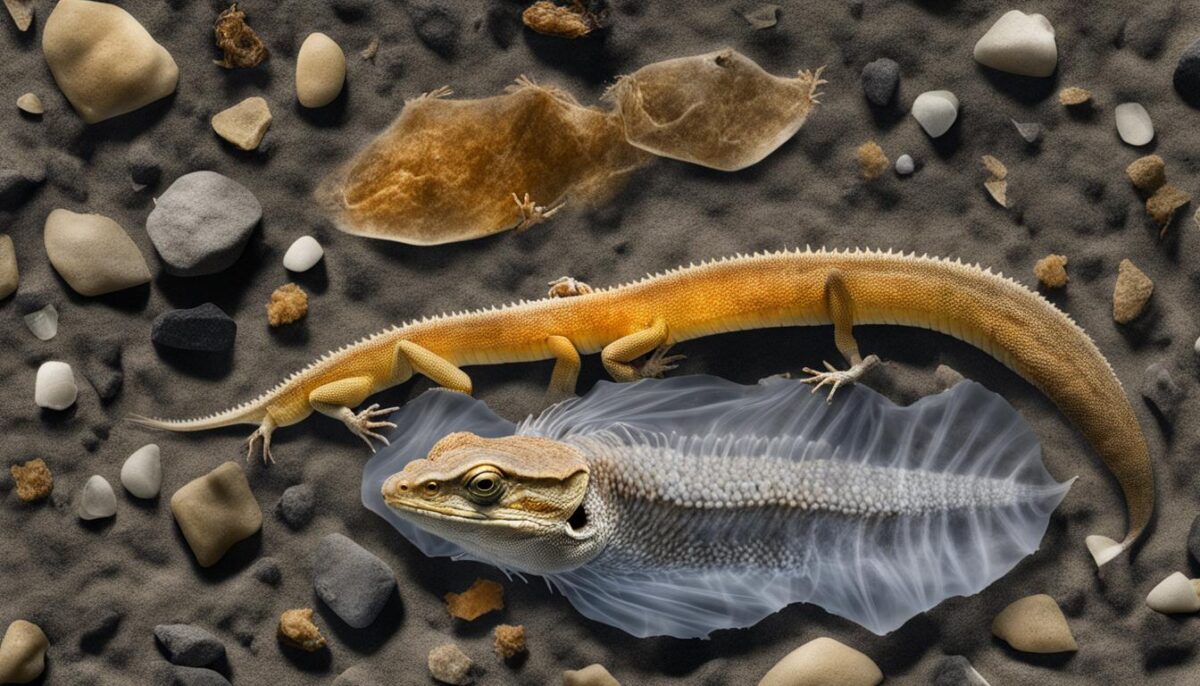
Signs and Symptoms of Impacted Bearded Dragons
It is important to be aware of the signs and symptoms that indicate a bearded dragon may be experiencing impaction. Recognizing these signs early on can prompt timely intervention, potentially preventing further complications. The following are common signs and symptoms of impacted bearded dragons:
- Lack of appetite: Bearded dragons with impaction may show a decrease or complete loss of appetite. This can be a signal that something is obstructing their digestive system.
- Irregular or no bowel movements: Difficulty passing stool or the absence of bowel movements is a significant symptom of impaction. This is usually accompanied by straining or visible discomfort.
- Lethargy: Impacted bearded dragons tend to become lethargic and may display a lack of energy or interest in their surroundings.
- Partial paralysis in the hind legs: In severe cases of impaction, bearded dragons may experience partial paralysis in their hind legs due to pressure on the spine or nerves.
- Bumps along the back: A telltale sign of impaction is the presence of noticeable bumps or irregularities along the dragon’s back. These bumps are often caused by undigested food or fecal matter.
If your bearded dragon exhibits any of these signs and is not behaving normally, it is crucial to seek immediate veterinary attention. A professional evaluation can help determine the severity of the impaction and guide appropriate treatment.
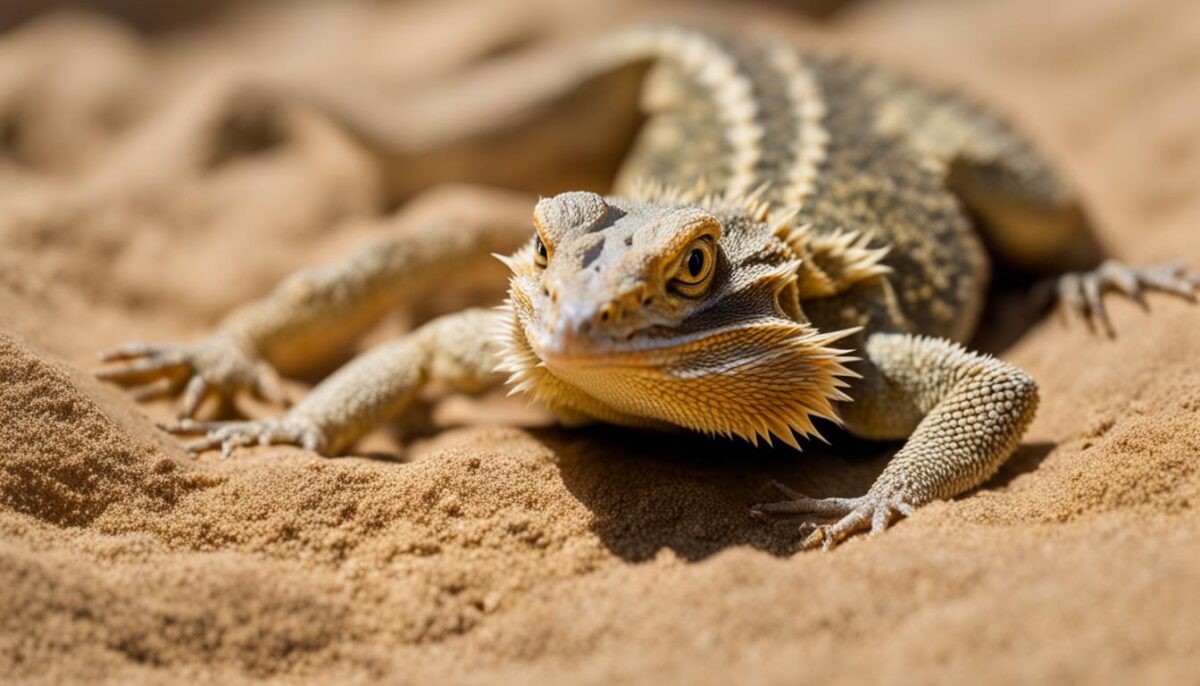
Prevention of Impaction in Bearded Dragons
Preventing impaction in bearded dragons is essential for their overall health and well-being. By implementing a few simple practices, you can significantly reduce the risk of your pet experiencing this potentially life-threatening condition. Here are some key prevention tips to keep in mind:
- Feed appropriate food sizes: When offering food to your bearded dragon, it is crucial to ensure that the food items are smaller in size than the space between their eyes. This helps prevent blockages in their digestive tract. Opt for appropriately sized food options, such as small crickets, appropriately sized worms, and chopped leafy greens.
- Maintain proper habitat temperatures: Temperature plays a crucial role in promoting healthy digestion in bearded dragons. After feeding, it is important to provide the appropriate temperatures in their habitat. This aids in efficient digestion and reduces the chances of impaction. Use a reliable thermometer to monitor the temperatures and make adjustments as necessary.
- Use safe substrates: The substrate you choose for your bearded dragon’s habitat can have a significant impact on their health. Avoid using substrates that pose a risk if ingested, such as Calci-Sand or pellets. Instead, opt for safe alternatives like ceramic tile or reptile carpet.
To visualize the prevention measures for impaction in bearded dragons, refer to the table below:
| Prevention Measures | Effectiveness |
|---|---|
| Feeding appropriate food sizes | Highly effective |
| Maintaining proper habitat temperatures | Essential for digestion |
| Using safe substrates | Reduces ingestion risks |
The Importance of Prevention
“Prevention plays a crucial role in ensuring the well-being of bearded dragons. By following these preventive measures, you can significantly reduce the risk of impaction, allowing your beloved pet to thrive.”
By following these preventative measures, you can minimize the chances of your bearded dragon experiencing impaction and promote their overall digestive health. However, it is important to note that even with the best prevention practices, impaction can still occur. Stay vigilant and seek immediate veterinary care if you notice any signs or symptoms of impaction in your bearded dragon.
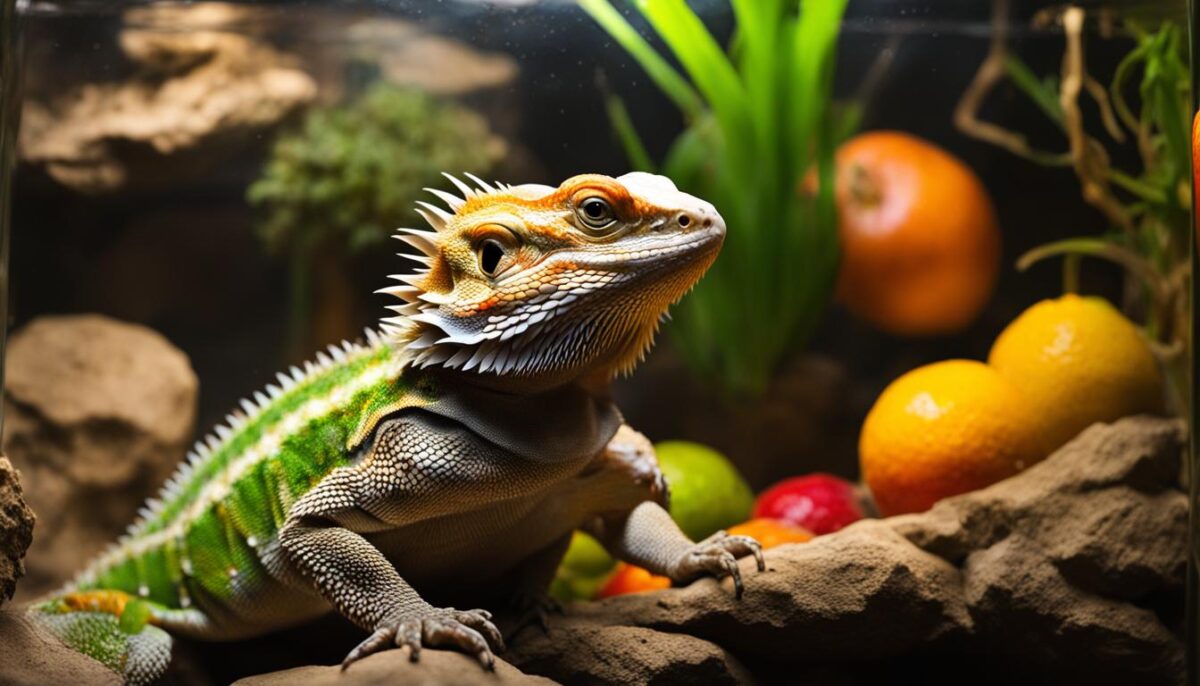
Treatment Options for Bearded Dragon Impaction
Mild cases of bearded dragon impaction can often be resolved with at-home treatments. One effective method is giving the bearded dragon warm baths, which helps to stimulate the digestive system and promote movement in the bowels. During the bath, gently massaging the abdomen can aid in the process of breaking up the blockage and facilitating its passage.
However, for severe cases of bearded dragon impaction, it is crucial to seek professional veterinary care. A veterinarian who specializes in treating exotic animals will be able to provide the appropriate treatment based on the severity of the impaction. Treatment options may include:
- Laxatives: These medications are used to soften the stool and promote bowel movements, making it easier for the bearded dragon to pass the blockage.
- Enemas: In some cases, an enema may be necessary to flush out the impaction and clear the digestive tract.
- Surgery: If all other treatment options have failed, surgery may be required to remove the blockage. This is typically a last resort and is reserved for severe cases where the impaction cannot be resolved through non-invasive methods.
It is important to consult with a qualified veterinarian to determine the best course of action for your bearded dragon. They will be able to assess the severity of the impaction and recommend the most appropriate treatment plan. Early intervention and prompt veterinary care are essential for successful treatment and the overall well-being of your bearded dragon.
“Professional veterinary care is crucial for severe cases of bearded dragon impaction. It is important to consult with a qualified veterinarian to determine the best course of action.”
By providing the right treatment for bearded dragon impaction, you can help your pet recover and prevent further complications. Remember to follow the advice of your veterinarian and provide ongoing care to ensure the health and well-being of your bearded dragon.
| Treatment Option | Description |
|---|---|
| Laxatives | Medications that soften the stool and promote bowel movements, aiding in the passage of the impaction. |
| Enemas | A procedure in which a liquid solution is used to flush out the impaction and clear the digestive tract. |
| Surgery | A last resort option where a veterinarian removes the impaction through a surgical procedure. |
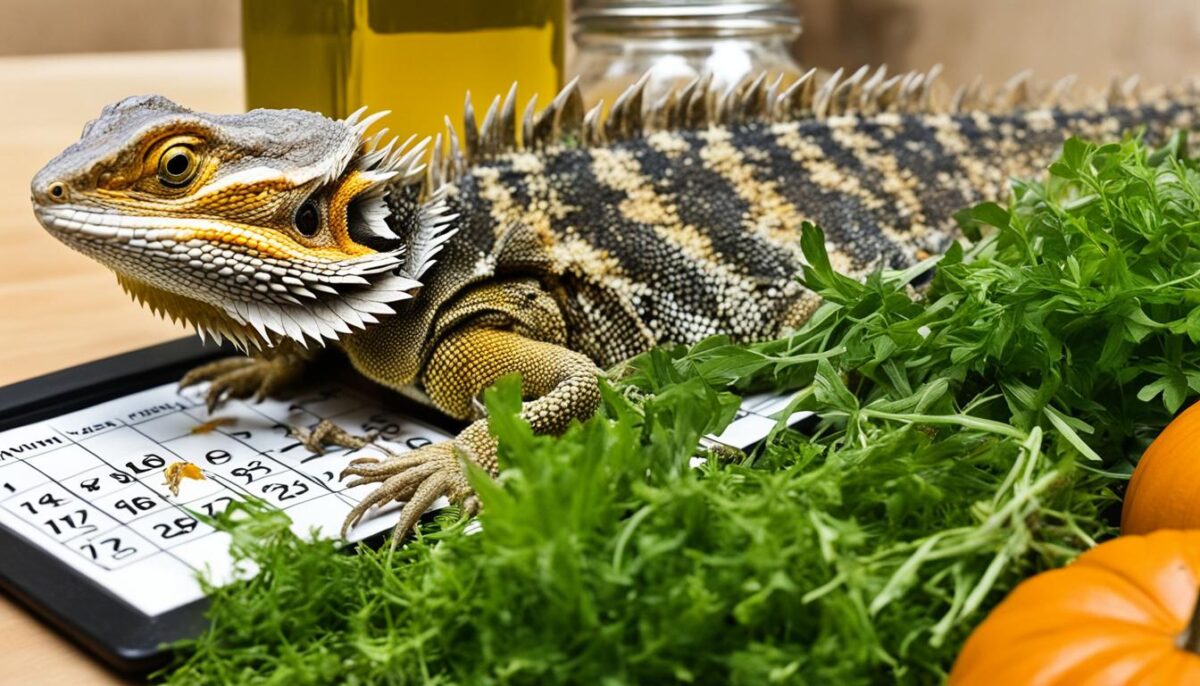
Surgical Options for Bearded Dragon Impaction
In cases where other treatments have been ineffective, surgery may be necessary to remove the impaction in bearded dragons. If the blockage is significant and cannot be cleared with enemas or laxatives, a veterinarian may recommend surgery.
The cost of surgery can vary depending on the location and the veterinarian, with prices ranging from $300 to $1200. It is important to consult with a reptile veterinarian to determine the best course of action for your bearded dragon.
Please note that surgery should only be considered as a last resort when all other options have been exhausted. It is a delicate procedure that carries risks, and the decision to proceed should be made in consultation with a qualified professional.
Conclusion
In conclusion, caring for an impacted bearded dragon requires diligent attention to preventive measures and immediate veterinary care. Impaction is a serious condition that can be avoided by providing proper care and feeding habits. Early detection of impaction symptoms, such as a lack of appetite and irregular bowel movements, is key to successful treatment.
By following the recommended preventive measures, such as feeding appropriately sized food items and providing the correct temperatures in their habitat, bearded dragons can be spared from the risk of impaction. Additionally, prompt veterinary care is crucial for severe cases, as professional treatment options like laxatives, enemas, or surgery may be necessary.
With the right care and treatment, impacted bearded dragons can recover and regain their health and well-being. Remember to always consult with a reptile veterinarian who specializes in the care of these unique creatures. They can provide the best guidance and care options for your bearded dragon, ensuring a healthy, happy, and impaction-free life.
FAQ
What is impaction in bearded dragons?
Impaction in bearded dragons occurs when the digestive tract is blocked by a solid or semi-solid mass, preventing proper digestion and elimination.
What are the common causes of impaction in bearded dragons?
Common causes of impaction in bearded dragons include eating food items that are too large for their digestive tract, improper temperatures in the habitat, and ingestion of dangerous substrates.
What are the signs and symptoms of impaction in bearded dragons?
Signs and symptoms of impaction in bearded dragons include irregular bowel movements, lack of appetite, lethargy, leg trembles, regurgitation, and bumps along the back.
How can impaction in bearded dragons be prevented?
Impaction in bearded dragons can be prevented by feeding them appropriately sized food, maintaining proper habitat temperatures, and using safe substrates in the enclosure.
What treatment options are available for bearded dragon impaction?
Treatment options for bearded dragon impaction include warm baths, gentle massages, dietary changes, and in severe cases, veterinary care such as laxatives, enemas, or surgery.
Are there any home remedies for bearded dragon impaction?
While there are some home remedies such as olive oil, soft foods, and warm baths that may help with mild impaction, they should only be used as a temporary measure and professional veterinary care should be sought.
Are there surgical options for bearded dragon impaction?
In severe cases where other treatments have been ineffective, surgery may be necessary to remove the impaction in bearded dragons.
What is the recovery process like for impacted bearded dragons?
The recovery process for impacted bearded dragons depends on the severity of the impaction and the chosen treatment method. With prompt veterinary care and proper treatment, impacted bearded dragons can recover and regain their health and well-being.

